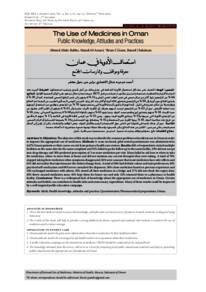وثيقة
The Use of medicines in Oman : public knowledge, attitudes and practices.
المساهمون
عناوين أخرى
استعمال الأدوية في عمان : معرفة ومواقف وممارسات المجتمع
الناشر
College of Medicine, Sultan Qaboos University.
ميلادي
2009-08
اللغة
الأنجليزية
الملخص الإنجليزي
Objectives: The objective of this study was to identify the common problems of medicine use in Oman in order to improve the appropriate use of medicines. Methods: A cross-sectional, pilot-tested questionnaire was administered to 6,675 Omani patients or their carers on exit from primary health care centres. Results: 66% of respondents visited multiple facilities on the same date for the same complaint and 51% failed to go for follow up to the same facility. 39% did not accept non-drug therapy and 30% preferred prescription of 3 or more medicines per visit. Many failed to ask how or when to take the medicines, where to store them at home and did not mention any current therapies they were taking. A total of 70% stopped taking their medicines when symptoms disappeared; 26% were unaware that most medicines have side-effects and 61% did not realise that injections are the riskiest dosage form. A total of 54% had definite colour and taste preferences; 43% practised self-medication and 68% never consulted the dispenser; 36% chose medicines based on previous experience and 33% exchanged medicines with others; 55% stored all their medicines in a fridge and 17% did not check the expiry date; 45% threw unused medicines away; 41% kept them for future use and only 12% returned them to a pharmacy or health facility. Conclusions:There is a widespread lack of knowledge about the appropriate use of medicines in Oman. Certain attitudes and beliefs can contribute to health risks and unnecessary expenditure. Many of these results could be improved by a well-targeted public education campaign.
المجموعة
URL المصدر
الملخص العربي
الهدف: التعرف على مشاكل استعمال الأدوية الشائعة في عمان وذلك من أجل تحسين وترشيد استعمالها. الطريقة: أجريت هذه الدراسة الارتيادية المقطعية باستخدام استبيان مكتوب تم تعبئته من قبل 6675 مريضا عمانيا خلال ترددهم على المراكز الصحية الأولية. النتائج: 66% من المراجعين زاروا أكثر من مركز صحي في نفس الوقت لنفس المرض. و51% لا يعودون إلى نفس المرفق الصحي للمتابعة. كما أن 39% لا يقبلون العلاج بدون أدوية وأن 30% من المراجعين يفضلون ثلاثة أدوية وأكثر عند كل زيارة. كثير من المرضى لا يسألون الطبيب عن كيفية اخذ العلاج وتوقيته ولا عن مكان تسخينه في المنزل. كما أنهم لا يذكرون أسماء الأدوية التي يستخدمونها. 70% من المراجعين يتوقفون عن استعمال أدويتهم عند اختفاء الأعراض. تبين أن 62% من المراجعين ليست لديهم معرفة بأن للأدوية تأثيرات جانبية وأن 61% لا يعرفون أن الحقن أكثر خطورة من حيث الجرعة. 54% منهم يفضلون لون وطعم محدد للدواء بينما يقوم 43% منهم بالمدواه الذاتية و68% لا يستشيروا الصيدلي. يختار 36% من المراجعين الأدوية التي جربوها و33% يتبادلون الأدوية فيما بينهم. يخزن 55% من المرضى كافة الأدوية في الثلاجة و17% منهم لا يتأكدون من تاريخ نفاذ صلاحية الدواء. 45% يرموا الأدوية غير المستعملة و41% يحتفظوا بها للمستقبل و16% يعيدوها للصيدلية أو المركز الصحي. الخلاصة: تبين أن هناك نقصا في المعرفة لدى الناس حول الاستخدام الرشيد والأمثل للدواء. بعض المواقف والمعتقدات يمكن أن تؤدي إلى أخطار صحية وهدر مالي غير مبرر. الكثير من هذه النتائج يمكن تحسينها بواسطة حملة توعوية صحية جماهيرية ذات أهداف محددة.
قالب العنصر
مقالات الدوريات

